“If you were looking aside and mentally adding up the hours until the execution of a young killer, all that registered was something dark flashing by. But if you happened to be gazing directly at the window in question and you happened as well to be feeling unprecedentedly calm, four-tenths of a second was more than enough time to identify the falling object as your husband of forty-seven years.” — Jonathan Franzen, The Corrections
Note: beginning with this collection of book reviews, I’m no longer linking book covers and titles to Barnes & Noble, whose book description pages have of late become unacceptably mercantile. Instead, I’m linking to Goodreads, an online book club.
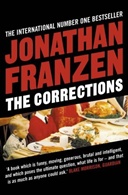 |
The Corrections, by Jonathan Franzen 4.5 stars? Yes, it is that good. When I read Jonathan Franzen’s Freedom a few months ago (reviewed here), I was reminded of Phillip Henscher’s The Northern Clemency (reviewed here), a big novel about ordinary people living what from a distance might look like ordinary lives, but which, viewed from from a closer vantage point, become extraordinary … and extraordinarily fascinating. Franzen, like Henscher, narrates his stories in an old-fashioned omniscient voice, getting inside his characters’ heads to reveal their innermost thoughts, fears, and motivations. In the process he creates real people … people very much like you and me, people we recognize and care about. People real enough to make us squirm in embarrassment, real enough to make us cry. As I said in my review of Freedom, Franzen’s characters are so real that when they frustrate you, you sometimes try to “shout at them through paper and ink because you know they are really there, separated from you only by artificial barrier of the book in your hands, and they might just hear you if you shout loud enough.” This is great writing, really staggeringly great writing. |
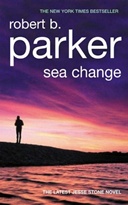 |
Sea Change, by Robert B. Parker This was my second Jesse Stone book (my wife and I are great fans of the movies and have seen them all twice). I will keep this short and fast, as, once again, Parker’s book was a short, fast read (I literally finished it in a day). With Sea Change, there is a direct connection between the book and the movie, although the nefarious doings in the book are far more extensive, evil, and (as you would expect) adult. And once again, I noted more differences between the literary Jesse Stone and his cinematic counterpart. Both are great, just different. Parker’s Jesse Stone series … all of which I shall devour, no doubt … are right up there with Ed McBain’s 97th Precinct novels: gripping, vivid, memorable, addictive. I only wish I’d discovered them sooner. |
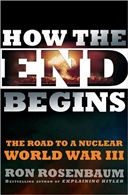 |
How the End Begins: The Road to a Nuclear World War III, by Ron Rosenbaum Actual rating: 3 stars for content, 2 stars for editing. Ron Rosenbaum tips his hand very early in this book about the current state of nuclear weapons and the threat that they might, despite reductions in tensions between major powers, still be used: on page 20 or so, without explanation or clarification, he labels the classic movie On the Beach “nuke porn.” Rosenbaum is a no-nuke crusader, but who can blame him? He explodes the story our betters tell us about the nuclear arsenal: that the missiles and warheads are tightly controlled and impossible to launch without approval from the president himself. It turns out there are any number of ways in which individual missile launch crews and commanders can launch without approval, and indeed many reasons why they might do so (as in an enemy first strike that decapitates national leadership and command & control). Presumably the same applies to other nuclear powers. The rise of smaller nuclear powers (Pakistan, India, Israel, North Korea, potentially Iran) has only increased the possibility that nukes will be used, and Rosenbaum convincingly argues that small nuclear conflicts will likely grow into major power nuclear conflicts. Rosenbaum exposes a nuclear/military/industrial complex whose movers & shakers cannot imagine fundamental change, and describes the service parochialism that forces us to hang onto the obsolete and now-senseless “triad” of nuclear deterrence: land-based bombers, land-based missiles, and mobile ballistic missile submarines, arguing that a more sensible national deterrence would consist entirely of submarines — which will never happen so long as the Air Force has its say. Moralists will like the way Rosenbaum keeps coming back to his central thesis: the emptiness of our justification for nuclear retaliation (we’re already dead and our counterattack will only result in the death of additional millions). He finds a few nuclear officials who are willing to entertain his thesis, but none who would refuse to turn the launch key if ordered to. Did you know the Russians actually have a Doomsday Machine? It’s called PERIMETR, and its purpose is to launch a nuclear counterattack even if every human being in Russia is instantly killed in a first strike against it. Apparently the US does not have such a capability, and depends on an elaborate system of orders and authentications to launch a counterattack — a system which, as I previously mentioned, can be easily bypassed by individual launch crews and commanders. Damn. All in all, this is a sobering book. Some day, some way, someone is going to set off a nuke, and only the most hopeless optimist can hope that spark won’t set off a larger nuclear conflagration, potentially even World War III. I mentioned editing. From beginning to end I encountered verb/tense disagreement, superfluous commas, and just plain awkward phraseology. It’s irritating to repeatedly stumble over errors while reading a book that has important things to say. We all make errors when we write, but don’t major publishers edit them out? C’mon, Simon & Schuster, do your job! |
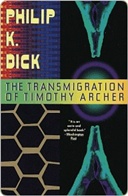 |
The Transmigration of Timothy Archer, by Philip K. Dick My knowledge of Philip K. Dick is limited. I’ve read only two of his novels: In Milton Lumky Territory (reviewed here), an early work from the 1950s, and this novel, the last one he wrote, published shortly after his death in 1982. Though PKD is famous for his science fiction novels (the most famous example being Do Androids Dream of Electric Sheep, the basis for the movie Blade Runner), I can’t recall having read any of his SF. I expected The Transmigration of Timothy Archer to be SF (not only does my library have it shelved in the SF section, it won a Nebula Award in 1982), but to my surprise it turned out to be straight fiction, like In Milton Lumky Territory. Regardless of my expectations, I quickly found myself wrapped up in the novel. Despite the spiritual nature of the story, PKD’s fiction reminds me of Jonathan Franzen’s … honest, personal, believable, sympathetic, forgiving of human foibles and weaknesses. PKD’s female narrator, Angel Archer, despite her stoner Berkeley lifestyle, is as level-headed as can be, and I was quite taken with her. Angel’s experiences with Jeff and Timothy Archer, Timothy’s mistress Kirsten, and her schizophrenic son Bill, have an autobiographical feel. Reading others’ reviews of this novel, I now know that PKD was in fact friends with a famous bishop, so there’s good reason to think there’s a lot of PKD in this novel. I also learned that PKD regarded this novel as the third of his Valis trilogy, and have already ordered the first two novels, Valis and The Divine Invasion, which, I am told, are more in the science fiction camp. PKD is the real thing, and I feel a Dickish binge coming on. |
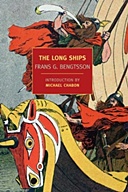 |
The Long Ships, by Frans Gunnar Bengtsson The Long Ships is the saga of Red Orm, a Norseman who is kidnapped as a young teenager and becomes a Viking, then a slave, a mercenary warrior, a Viking again, a chieftain, a convert to Christianity, a family man and patriarch, and finally a Viking once again. I had almost forgotten the Norse and Icelandic sagas I read as a kid; certainly I had forgotten how much fun they were to read. These are stories of nonstop adventure, fighting, treasure, betrayal, good and bad luck, friendship, lust, strong drink; the joys of a simple, hard life. Michael Chabon loved this book and wrote the introduction to the edition I read; if Michael Chabon, one of my favorite authors, liked it, how could I not? The Long Ships is not an actual Norse saga; it was written during WWII and only modeled on the old sagas. Bengtsson, unlike the tale-tellers of old, takes the time and trouble to show the reader something of the domestic and seagoing details of life in the 10th century, and devotes a good portion of the book to the gradual and grudging adoption of Christianity in the Scandinavian countries. This makes the story richer, in my opinion. But the good stuff, as with the original sagas, is the adventure. In The Long Ships, adventure starts on the first page and doesn’t let up until the last one. |
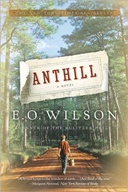 |
Anthill, by E. O. Wilson I’m a devotee of young adult fiction, where the stories are reliably full of action and to the point. E.O. Wilson’s Anthill is so labeled. Although it is very much to the point, I was disappointed in the lack of action, though I will admit there is some: as a young teenager, Raff encounters a fearsome backwoods hermit; later, as an adult, Raff flees three bad men who mean to shoot and kill him, and is rescued by the same backwoods hermit. Also, there are the ants. The best part of the book, to me, was the middle section describing the life cycle of an ant colony and the lives of ants within that colony. E.O. Wilson makes the point that we humans are part of a colony too, and that our lives differ not all that much from the lives of ants. Interesting, to be sure, but it does not make for an exciting novel. Reading Anthill is like sitting through an excruciatingly long and repetitive biology lecture. Thank goodness the professor delivering the lecture is a likeable guy, otherwise I’d have put the book down halfway through and never picked it up again. E.O. Wilson is not a novelist … he is a naturalist, and if you are a student of nature, Anthill should appeal to you. Just don’t expect much in the way of thrills and chills. |
Re: PKD. It’s about time you paid attention to Philip K. Dick. Especially as you read the novels of his literary descendent, William Gibson.
So here’s a little educational background. When PKD was in high school, he submitted a story to his English teacher. The story, while not exactly fitting the assignment, was so extraordinary that the teacher suggested he try submitting his stories to the pulp SF mags. And thus, a great science fiction writer was born. I happen to know this stuff because that high school teacher was my mother, then Margaret Wolfson. Twenty years later, he looked her up and became fast friends with my father who also became his attorney. In fact, when Dick was admitted to Ross Hospital’s psychiatric unit for one of his periodic 72-hour observations, he gave the manuscript of “Flow my tears, the policeman said,” to my father for safekeeping, fearing the he (Dick) was on the verge of destroying it.
Dick’s daughter, still in Marin County, maintains a foundation in his name.
Just another little factoid to add to your list.